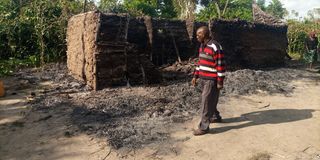Change tack on Al-Shabaab

One of the houses that was burned by suspected Al Shabaab militants in Salama Block 17 village in Lamu County on Wednesday, July 12.
Despite government efforts to fight Al-Shabaab, its attacks have escalated with many deaths and serious injuries, especially in northeastern counties of Mandera, Garissa and Wajir and Lamu in the coast region.
The Institute of Security Studies (ISS) says that, in the past three weeks, more than 30 security force officers have been killed by improvised explosive devices (IEDs) in more than 10 attacks.
Those attacks affect daily activities like businesses, education, transport and tourism. Should they persist or escalate, the country will suffer more loss. Unemployment and high cost of living are said to force some youth to join terrorism for the money, leading to more attacks and difficulty in dealing with it.
First, Kenya has security agencies that are capable of fighting terrorists. The President, being the Commander-in-Chief of the Kenya Defence Forces, should be in the frontline to ensure security and enforce border surveillance and on-foot patrols.
Secondly, the county governments should have more decisive roles in co-funding police reserve patrols, sensitising communities and allocating cash to projects to tackle radicalisation and recruitment.
Thirdly, empower locals to play a bigger role in security decisions so as to address the community discontent that insurgents often exploit and exercise caution in the impact area, reconfirm the status of road routes before departure and adhere to all instructions issued by the local authorities.
Lastly, building up local cadres of professionals could help begin to address the problem Al-Shabaab, where, youths can be trained and acquire income-generating life skills for self-employment.
- Mr Sifuna is a journalism and communication student at Rongo university. [email protected].





